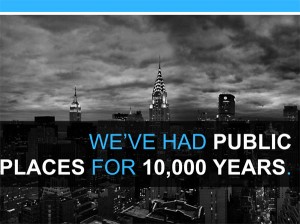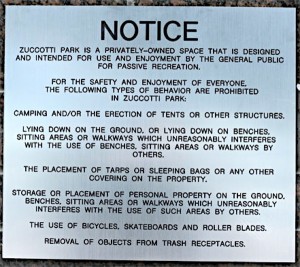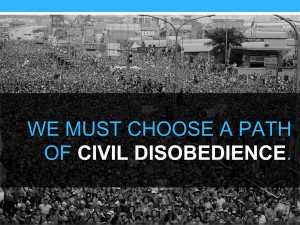 A stream of #TDS14 tweets from revved-up librarians accompanied the closing keynote speech by Anil Dash, a blogger, entrepreneur, and cofounder and CEO of ThinkUp, during The Digital Shift: Libraries @ the Center, a virtual event from Library Journal and School Library Journal. School Library Journal executive editor Kathy Ishizuka introduced and hosted Dash.
A stream of #TDS14 tweets from revved-up librarians accompanied the closing keynote speech by Anil Dash, a blogger, entrepreneur, and cofounder and CEO of ThinkUp, during The Digital Shift: Libraries @ the Center, a virtual event from Library Journal and School Library Journal. School Library Journal executive editor Kathy Ishizuka introduced and hosted Dash.
In an intellectually provocative presentation focusing on the privatization of the Internet, Dash called upon librarians, stewards of public service and intellectual freedom, to raise their voices and demand a more transparent, public Web.

Slides from Anil Dash’s keynote presentation.
“And the crowd goes wild!! Energized librarians from @anildash keynote at #tds14 to (re)build a true public web,” tweeted Abbie M. Anderson (@librabbie).
“Social networks are not public. They’re privately owned,” Dash emphasized during his 45-minute keynote. “It matters. For public discourse; for the common good.”
As an analogy for the vast corporate dominance on the Web, Dash referenced the corporate ownership of much public space in New York City, conceived decades ago as a way to create a private-sector revenue stream that would bring the city out of financial doldrums. New commercial properties were allowed benefits if they created adjacent open areas for public use.
Private control of public discourse
 Dash cited the example of Zuccotti Park in lower Manhattan, a privately owned open space where the Occupy Wall Street demonstration took place in 2011. He said that such gathering spots are, in practice, often unappealing concrete swaths that do not truly serve the public and are subject to many rules of use set by the corporations that own them.
Dash cited the example of Zuccotti Park in lower Manhattan, a privately owned open space where the Occupy Wall Street demonstration took place in 2011. He said that such gathering spots are, in practice, often unappealing concrete swaths that do not truly serve the public and are subject to many rules of use set by the corporations that own them.
Similarly, Dash said, large Internet venues where people congregate, such as Facebook, are subject to terms of service with which users must comply in order to participate. These rules are often updated with little knowledge on users’ part.
To demonstrate how extensively social networking is steered by corporations, Dash noted that information about disaster relief, including post-hurricane Sandy material, has often been made available through Facebook.
It was not always thus, he reminded listeners. Looking back, Dash noted that the Internet was first developed by academics as a “culture of sharing, creating, and connecting.” He added, “It was like a creative community, like a scene with lots of bands of a collection of artists influenced by others’ works.”
Retrieving the civic-minded spirit of the early Internet
“There were a few principles: one, if you created something, you could own your data,” He said. “You could take it with you to another site, control how it was presented to the world. It wouldn’t be deleted without your being notified.” For example, with Flickr, “you could assign a Creative Commons license and create your own remix.”
 He called on librarians to revive that spirit of openness and fight for more unregulated online spaces today. There is a “disconnect between values and technology—what we believe and what we are actually able to do. Librarians can do the most about it,” he said.
He called on librarians to revive that spirit of openness and fight for more unregulated online spaces today. There is a “disconnect between values and technology—what we believe and what we are actually able to do. Librarians can do the most about it,” he said.
A self-described former Silicon Valley heavyweight who had “front row” access to hot, nascent apps, Dash included himself among those tech developers who propelled social networking technology with little foresight or conscience about its long-term impact on privacy and open discourse.
“Note to technologists: We have to reckon with our own arrogance,” Dash said. “From the tech [world] that I come from, social Web creators, we were shortsighted…. We let the Web and the people who created it forget the public.”
When now-dominant social media apps were in their infancy, developers never imagined that billions would be using them.
Back then, users’ page views and “likes” did not determine advertising streams and Google rankings the way they do now, he reminded listeners. Today, people still don’t always know that when they “like” something, their “vote” carries value. “Once you’ve put an economic value [on it, you’ve] corrupted meaning,” he said.
A call to arms
A self-described optimist, Dash believes the Web can still be reclaimed to align with the values and culture of the public. “Now that we have terms of service [guiding] our discourse, we must raise our voices” and say, “’this law does not reflect my values,’” he urged.
When Instagram announced it would update its terms so that it could license users’ photos for advertising, “the community was up in arms and stopped that change from happening,” he noted.
Dash cited positive examples of civic-minded “corners of the Web that are very influence by curatorial culture,” including the community Web blog Metafilter and the Q&A forum Stack Exchange.
“There is some way that the law mismatches cultural practice,” he said. “We must support institutions that protect our values,” including libraries.
 People defy terms of service all the time, Dash pointed out, by “knowingly putting up stuff that will be taken down” from Internet sites. He sees this as a positive form of social activism. “We have the ability to [make an impact] which through any other context would be called civil disobedience.”
People defy terms of service all the time, Dash pointed out, by “knowingly putting up stuff that will be taken down” from Internet sites. He sees this as a positive form of social activism. “We have the ability to [make an impact] which through any other context would be called civil disobedience.”
While convinced that a single person can make a difference, Dash called on the audience to participate in a “Million Mixer March” to protest service terms such as control over a user’s posted imagery.
“There are “no better stewards of that than librarians,” he said. “We need to hear your voice.”
At the conclusion of Dash’s presentation, Ishizuka noted that these issues point to the essential role of digital literacy in education. She also wondered why librarians have not rallied more adamantly to preserve net neutrality, whose erosion also threatens to privilege private content on the Web.
Often used as another term for the Open Internet, net neutrality refers to the concept of non-hierarchical Web content. Net neutrality is compromised when carriers are allowed to accept payment from entities seeking enhanced access to their networks. In practice, this means that moneyed enterprises can deliver material more quickly than small businesses or nonprofit agencies, such as libraries.
Net neutrality, Dash responded, is “complicated and hard to understand,” and that may be why it is daunting for people to champion. It is compromised in subtle ways so that users do not grasp the larger consequences, in his view.
“It’s analogous to climate change,” he noted. “I can’t see it in front of me. If the climate’s changing, why is it snowing? If net neutrality is [under] threat, why is there this great movie on Netflix?”


